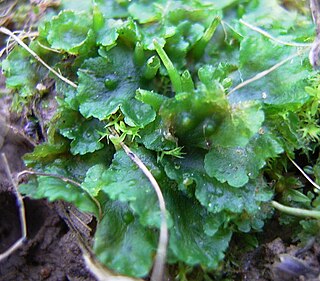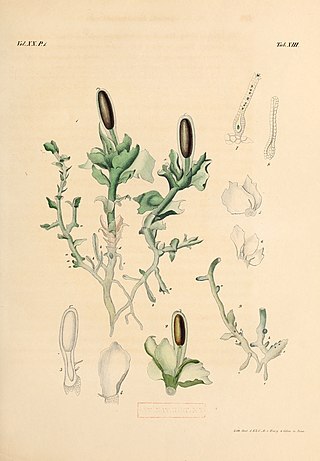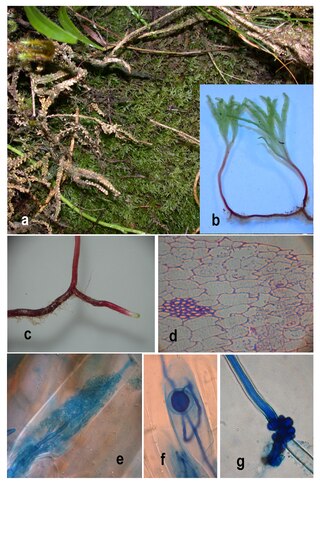
Genus is a taxonomic rank above species and below family as used in the biological classification of living and fossil organisms as well as viruses. In binomial nomenclature, the genus name forms the first part of the binomial species name for each species within the genus.

In taxonomy, binomial nomenclature, also called binary nomenclature, is a formal system of naming species of living things by giving each a name composed of two parts, both of which use Latin grammatical forms, although they can be based on words from other languages. Such a name is called a binomial name, a binomen, binominal name, or a scientific name; more informally it is also historically called a Latin name. In the International Code of Zoological Nomenclature (ICZN), the system is also called binominal nomenclature, with an "n" before the "al" in "binominal", which is not a typographic error, meaning "two-name naming system".

In zoological nomenclature, a type species is the species name with which the name of a genus or subgenus is considered to be permanently taxonomically associated, i.e., the species that contains the biological type specimen. A similar concept is used for suprageneric groups and called a type genus.

The Notothyladaceae is the only family of hornworts in the order Notothyladales.

Monosolenium tenerum, is a weedy species of liverwort found in east Asia. It is the only species in the genus Monosolenium and the family Monosoleniaceae. It is commonly confused with similar-looking plants in the aquarium trade like Pellia liverworts and Süsswassertang, a fern gametophyte.

Metzgeria is a genus of thalloid liverworts in the family Metzgeriaceae.
Andrewsianthus is a genus of liverworts in the family Lophoziaceae.

Frullania is the only genus of liverworts in family Frullaniaceae. It contains the following species:

Kurzia is a genus of liverworts in the family Lepidoziaceae. It contains the following species. Kurzia crenacanthoideaG. Martens is a synonym of Kurzia gonyotricha(Sande Lac.) Grolle.

Lepidozia is a genus of liverwort in the family Lepidoziaceae. It was first proposed by Dumortier in 1835.
Luteolejeunea is a monotypic genus of liverwort in family Lejeuneaceae. It only contains the one species, Luteolejeunea herzogii(Buchloch) Piippo.

Haplomitriopsida is a class of liverworts comprising fifteen species in three genera. Recent cladistic analyses of nuclear, mitochondrial, and plastid gene sequences place this monophyletic group as the basal sister group to all other liverworts. The group thus provides a unique insight into the early evolution of liverworts in particular and of land plants in general.

Jensenia is a bryophyte plant genus in the liverwort family Pallaviciniaceae. It has been treated as a subgenus of Pallavicinia by several authors, though a set of features seems to set it apart as a genus. The six or seven species of the genus belong to a southern, possibly Gondwana element.
Calycularia is the only genus of liverwort in the family Calyculariaceae. It was formerly included within the Allisoniaceae, and it includes only two species.
Samuli Piippo is a Finnish competitive archer. A late beginner in competitive archery, Piippo made his debut on the Finnish national team at the age of 33, and roused a major surprise in his sporting career by booking one of the three individual Olympic places to Rio 2016 at the European Championships in Nottingham, Great Britain. While training full-time at a local archery range in his current residence Oulu, Piippo works as a web applications designer for an information technology firm.

Jyrki Nurminen is a most successful Finnish beach volleyball player, playing as a defender. He won the Finnish beach volleyball championship 6 times, in 2012, 2016, 2017, 2018, 2019 and 2020. During his career, Nurminen also played volleyball in Finnish championship league, but since 2016, he focuses entirely on the beach volleyball career. His partner in beach volleyball is currently Santeri Sirén. Nurminen has received the first level coaching volleyball license and works also as a coach of both, beach volleyball and volleyball. He is a founder of a company arranging beach volleyball events and camps. Company is also responsible for organizing Finnish open level tour in Finland - JNBT tour.

Heteroscyphus is a genus of liverworts in the family Lophocoleaceae. 87 species was accepted in this worldwide group in 2019.

Lophocolea is a genus of liverworts belonging to the family Lophocoleaceae. The genus has a cosmopolitan distribution.
Lepicolea is a genus of liverworts belonging to the family Lepicoleaceae.













